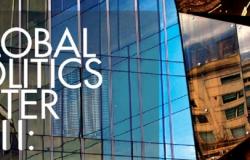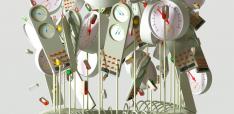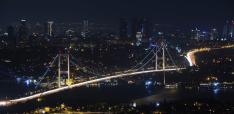Breaking the Gridlocks of Globalisation: The World According to David Held

One of the most panoramic, as well as readable analyses of our time’s conundrums can be found in David Held’s Global Politics After 9/11: Failed Wars, Political Fragmentation and the Rise of Authoritarianism.
In little more than a decade the American Century has come to a close. How did this come about and what has been the outcome in the international arena and in national societies? Are the international institutions established in the twentieth century still equipped to take on the global political, financial, and environmental crises that followed 9/11, an act of terror that was itself facilitated by globalisation? There is hardly a deficit of authorities on and opinions about these issues today.
That said, one of the most panoramic, as well as readable analyses of our time’s conundrums can be found in David Held’s recently published Global Politics After 9/11: Failed Wars, Political Fragmentation and the Rise of Authoritarianism (Wiley Blackwell, September 2016).
Held’s voice will sound familiar to many – as a professor of politics and international relations, public intellectual, and author/editor of more than 60 books on issues ranging from democratic theory to globalisation and cosmopolitanism, he has accompanied us for nearly four decades as we witness the changing political landscape.
The volume collects 30 of his essays (‘occasional pieces’, as he calls them), spanning the days following 9/11 to the present. The work addresses two major themes – the 9/11 wars and the Arab Spring, and the failure of a western politics of global cooperation through multilateral governance. A briefer third section considers ways that western politics can be revitalized. The smoothly written and insightful essays provide a succinct historical perspective and perhaps even a roadmap for moving forward.
Self-inflicted wounds
The various trajectories of analysis converge into a merciless verdict: the demise of the global liberal order has been the doing of the western political establishment. “In the wake of 9/11, the U.S. and its allies could have come together to defend what was under outrageous attack: citizens from across the world, democracy, justice, and the rule of law. But they did not.” Through ‘gross misjudgements’, ‘minimum wisdom’, ‘misconceived and naïve expectations’ and, may we add, hubris, western political establishments destroyed the order they were meant to safeguard.
Beginning with the war in Iraq in 2003, the west’s foreign policy had been essentially reduced by 2011 to a series of invasions in a vaguely defined war on terror. These actions did little more than reveal the United States’ and its allies’ inability to militarily contain even weak countries such as Afghanistan, Libya, and Syria. We are familiar with the outcome: the complete destabilisation of the Middle East, increased acts of terrorism and global insecurity, greater nationalism and xenophobia, a rise in autocratic government and the mass migration of millions. That these wide-reaching consequences were exponentially compounded by the 2008 financial crisis is, as Held shows, hardly surprising.
The harm done, Held notes, goes further: by engaging in such drawn out, misconceived wars, western powers damaged international law and institutions, destroyed any prospects for peace in this region in the near future, and undermined the credibility of democracy itself. The very structure of the liberal order – its institutional and normative framework – has been shaken, if not irreversibly damaged.
From subjects to citizens
How have these changes come about? Why did western powers decide to engage in such misconceived wars? Held deftly demonstrates how unfortunate policymaking decisions stemmed directly from western nations’ poor judgement and understanding of these countries. He attributes such poor judgement to both a lack of understanding of the historical and cultural context into which they were moving, and a failure to adequately prepare linguistically. This fatally undermined the grand project to democratise from the earliest stages. Western leaders, as Held demonstrates, further failed to understand that war can by no means ensure a transition to democracy. Democratisation entails, above all, a “shift in people’s identities from subjects to citizens.”
1989 and 2011
 A careful comparison of two historical moments – the Arab Spring and the revolutions in the former Soviet block in 1989 – allows Held to provide an astute analysis of the failure of Arab nations to make a transition to democracy. As Held shows, while the protests following Mohamed Bouazizi’s suicide in Tunisia initially seemed to hold the same promise as the revolutions in the former Eastern Europe in 1989, the Arab revolutions ultimately failed to establish democracy. In a detailed analysis in several essays he discerns what the Arab and European revolutions had in common. Both regions shared (mostly) failing economies and authoritarian regimes unable or unwilling to address these failings, as well as an increased awareness (through the media, for example) of alternative political systems. Another common feature was the increased role of religion (Catholicism and Islam, respectively) as it came to challenge political authority and also to offer a physical place for people to come together – in churches and mosques. However, even in 2011, a time Held characterises as holding great promise and opportunity, it was also apparent to him that there was already “great uncertainty” about the future of Middle East countries.
A careful comparison of two historical moments – the Arab Spring and the revolutions in the former Soviet block in 1989 – allows Held to provide an astute analysis of the failure of Arab nations to make a transition to democracy. As Held shows, while the protests following Mohamed Bouazizi’s suicide in Tunisia initially seemed to hold the same promise as the revolutions in the former Eastern Europe in 1989, the Arab revolutions ultimately failed to establish democracy. In a detailed analysis in several essays he discerns what the Arab and European revolutions had in common. Both regions shared (mostly) failing economies and authoritarian regimes unable or unwilling to address these failings, as well as an increased awareness (through the media, for example) of alternative political systems. Another common feature was the increased role of religion (Catholicism and Islam, respectively) as it came to challenge political authority and also to offer a physical place for people to come together – in churches and mosques. However, even in 2011, a time Held characterises as holding great promise and opportunity, it was also apparent to him that there was already “great uncertainty” about the future of Middle East countries.
In spite of these commonalities, the situation in Arab nations – although it varied slightly from country to country – did not allow these nations to make a smooth transition to democracy, in contrast to Europe, for a number of reasons. First, economic conditions in the region were generally poorer, secondly, regimes were more corrupt and, above all, as Held demonstrates, the political, social, and cultural history of these countries as well as the international setting were quite different in 2011 than in 1989. As he says of the citizens of Arab nations: a citizen will only submit to the “values and requirements of being a citizen of a democracy” if the seeds of democracy have already been planted, a process that took centuries in Europe. Finally, in 2011 the international institutions that might have been instrumental in the transition to democracy, such as the UN or WTO, were gridlocked.
However, what is surprising in this part of the analysis is that Held uses the post-communist revolutions in Europe as the gold standard of a successful transition to democracy. He therefore fails to question the widely shared, post-1989, assumption that the success of democracy in this region was inevitable given the past democratic traditions and the support of international institutions. As has become evident, nearly 30 years later, much has gone wrong in Poland, Hungary, Bulgaria and Romania, despite the availability of democratic traditions and the stabilising influence of EU membership.
State-centricity and a struggle among elites
Held attributes Arab nations’ failed transitions to democracy above all to twentieth century state-centred policies shaped by western powers – policies that no longer function in today’s interconnected world as he shows in a 2011 essay that examines the wars in Afghanistan, Iraq and Libya. The western powers of the twenty-first century have simply not understood the shifting political and economic world order. As Held explains, the world is now newly configured: for example Asia has been playing an increasingly important role; terrorist organisations are transcending national borders. Only an understanding of the discrepancies between local conflicts and the global, often intangible, causes and triggers of these conflicts will enable us to make sound political judgements and act accordingly.
Unfortunately, the Bush administration, and Tony Blair, as Held shows, “sought to explain the new threats to international security from transnational non-state actors in familiar, state-centric terms.” These leaders thus failed to take into account the complexity of these new configurations when they simply declared a war on terror and engaged in pre-emptive wars. In this way, The United States and their allies incurred the disapproval of much of the world, tarnishing irreparably the image of democracy and setting a dangerous example for the rest of the world. “It cannot be coherently argued that all states bar one must be bound to the rules and established practices of the post-war multilateral system,” as Held writes in the 2014 Wars of Decline.
Such pre-emptive wars as followed 9/11 (appearing to many to be nothing more than indiscriminate bombings in the Middle East to protect American interests) and the subsequent neglect to help these societies rebuild themselves compounded the problem. Though the Americans had been able to eradicate the threat of the Taliban in Afghanistan in early 2002, the US then left Afghanistan abruptly to focus on Iraq, never helping Afghanistan to rebuild, a pattern that has continued to be repeated in this region up to today, resulting in ruined countries, the displacement of millions of people, an increase in worldwide terrorism and an erosion of the stabilising force of the west. Rather than being guided by principles of “legitimacy, legality, and feasibility”, principles Held repeatedly calls for in his essays, the west (albeit unwittingly) abandoned these norms, thereby triggering the reassertion of authoritarian control. The situation consequently eroded into “a struggle among elites, a clash of personalities, celebrity politics, sound bite ‘debates’ and the naked pursuit of party and/or self-interest”. This 2014 essay has turned out in 2017 to be even more prophetic than Held had perhaps anticipated.
Interconnectedness
The legitimacy, legality, and feasibility a globalised world requires are hard to obtain. As Held shows, globalisation begets further interconnectedness. We have been globalised to the extent that all political relations have been turned on their head: “globalisation… has unsettled political relations, altered labour market conditions, created dense webs of global economic interconnectedness, shifted the costs and benefits of established social and economic policy, and formed new patterns of winners and losers.” Interconnection has its advantages and disadvantages, of course: vastly greater access to information for nearly a third of the world, for example, but, at the same time, any crisis that affects one place has an impact, often unintended and unwelcome, on many other places or people around the world.
These issues, as Held shows, can be organised into three types: those affecting sustaining our life chances (poverty or global infectious diseases), managing our rulebook, and sharing our planet (such as climate change) all the more urgent, particularly this last point. We applaud Held for according it equal status. In an increasingly complicated and interconnected world (a ‘world of overlapping communities of fate’, as Held names it), these are the urgent challenges facing us today.
Are the international institutions established after World War II equipped to handle these new challenges as they were in 1989? Held suggests that institutions such as the United Nations or the IMF, whose actions are largely determined by powerful, wealthy nations need to be “revitalized” in order to accommodate today’s interconnected world in which individual, sovereign states are much less relevant than the overall interests of a worldwide, interconnected citizenry.
The west, according to Held, with its multiple security, environmental, and economic failings, “can no longer rule through power and example alone”. Moreover, the Washington Consensus (the belief that market efficiency almost automatically leads to prosperity) is hardly proven to be a universal truth, given the success of places like China and India who only liberalized their markets once they were strong. Moreover, as other countries gain in wealth, such as in Asia, they can be expected to play a more influential role in addressing issues affecting the whole, interconnected world.
Held astutely demonstrates how the institutions themselves are inefficient and offers suggestions for reforming them. In Global Financial Governance (2009) he rightly attributes the gridlock in institutions such as the WTO to three major factors: 1) institutional fragmentation and competition between states, 2) no clear division of labour among members and 3) problems of accountability.
Thus, as Held shows, the old post-World War II arrangements that created political and financial stability for much of the world must now be revised insofar as they are inadequate for addressing today’s problems. The very political and economic institutions that arose from this prosperous period have created institutional gridlock resulting in “rising multipolarity, institutional inertia, harder problems and institutional fragmentation.”
Coercive power today
How can international institutions be revitalized? Held proposes a new international settlement in which three issues are continually addressed: “under what conditions should legitimate coercive power be wielded, to what ends and by whom?”
Ultimately, Held calls for the development of a new “cosmopolitan order of politics” vested in a multi-layered and multilevel polity bound by a common framework of law, itself anchored in democratic principles and human rights. Reconstructing rightful political authority in this way entails that, while individual countries continue to exercise authority alongside supranational regimes, all political actors are equally subject to a set of laws, rights and responsibilities. Public authority’s legitimacy at any level of this polity would therefore be determined by the extent to which it adheres to globally determined laws and principles for all people around the world.
The 15-year period the essays cover allows us to follow Held’s thought in reaction to significant events. This intimacy is of added value in that it brings us closer to our own, probably forgotten, reaction to these events and helps us check the potency of our own judgment. It is gripping to see whether the outcome he predicted turned out to be true as, for example, when we witness the way his optimism (and perhaps our own) about the Arab Spring in a 2011 essay has dissipated by 2014.
What is less effective in such a structure, however, is the order of the articles within each section, which doesn’t always make sense. Because the essays are not consistently arranged in chronological order it is sometimes difficult to see how particular strands of information fit with his overall argument: why would a 2010 essay on The Changing Face of Global Governance follow an (undated) article on Donald Trump’s electoral victory. Narratives can seem repetitive, or a summary of an article from, say, three years prior in the previous chapter, as though there were a significant time lapse between the readings when in fact we have only just turned the page.
It is also regrettable that the essays are not referenced to their original publication. Moreover, the overall narrative could have had one last proofread. Perhaps this e-book was never intended to be read from cover to cover on printed paper (as we did). But such irregularities in structure, proofreading and chronological order of the essays, whilst a distracting irritant, hardly undermine the rigour and relevance of the arguments and do no damage to the lucid and lively writing.
What about social media?
Considering the sweeping breath of the narrative, a surprising omission is the minimal consideration given to the harmful role that the internet in general and social media in particular have played in the post 9/11 world order. Held does point out that the availability of 24/7 news allowed terrorists to exploit the image of the exploding towers to their greatest advantage, but never directly addresses the problems the accelerated and globalised (social) media might have created. The remark, for instance, on "the rose tinted glasses of social media” (p.61) wets the readers’ appetite to hear more, while making them wonder whether Held’s own vision might be tainted by these same glasses. For example, in The Arab 1989 (2011) he sees the galvanised youth movement and the new technologies as inextricably linked, starkly contrasting the oppressive, old guard governments: “caught between the spotlight of instant global media and an energised youthful social movement these police states are being exposed as anachronistic, brittle and incapable of meeting the requirements of modern societies.” Held hardly ever considers the harmful role that technology might have played: social media such as Facebook that enables authoritarian states to spy on their citizens or to diffuse what we now call alternative facts.
Finally, while Held is critical of the west’s blindness to non-western social and political cultures, he never acknowledges that the social media is a tool developed by private western interests. We know that politics is now played out behind a screen. If we are to develop the means for addressing the cosmopolitan world order Held is calling for, should we not scrutinise more carefully this essential component?
A fatal flaw?
A longer, more evenly structured work would no doubt address this phenomenon, in addition to providing a more detailed blueprint for the revision of our current international institutions that Held is calling for.
Notwithstanding failings of format and precision, the essays’ tangible erudition and prescience are enviable.
Just days after 9/11, Held wrote that “any defensible, justifiable and sustainable response to the 11 September must be consistent with our founding principles and the aspiration of international society for security, law, and the impartial administration.” Sixteen years and at least thirty essays later, it is clear that Held’s advice – to recognize the gridlock of global and European institutions and to try to revise them in order to facilitate more global cooperation – has yet to be heeded, as a matter of urgency.
So goes the tale of the ending of the American Century and the withering away of the post-World War II international order as we knew it, leaving us in the grip of intensifying uncertainty and the rise of authoritarianism.
As astute as David Held is in exposing the fallacies and failures of western political judgment that have incurred our sorry predicament, he never seems to question the fundamental principles of the ‘American Century’. Might it be, however, that ‘Western Politics’ itself contains a genetic flaw? There could be something amiss in the project itself. Hopefully, this story is already in the works. The author of Introduction to Critical Theory (1980) owes us as much.
Jacqueline Kay Cessou taught political theory at the IEP in Paris and has served as writer and editor for UNESCO and other international organisations. She is currently writing a book on the impact of social media on politics. Albena Azmanova is Associate Professor of politics at the University of Kent; she is the author of The Scandal of Reason: A Critical Theory of Political Judgment (Columbia University Press, March 2012), among a long list of publications. She is currently writing a book with the working title The Crisis of ‘the Crisis of Capitalism’. This review first appeared on OpenDemocracy.
Please click here to download the e-book.


